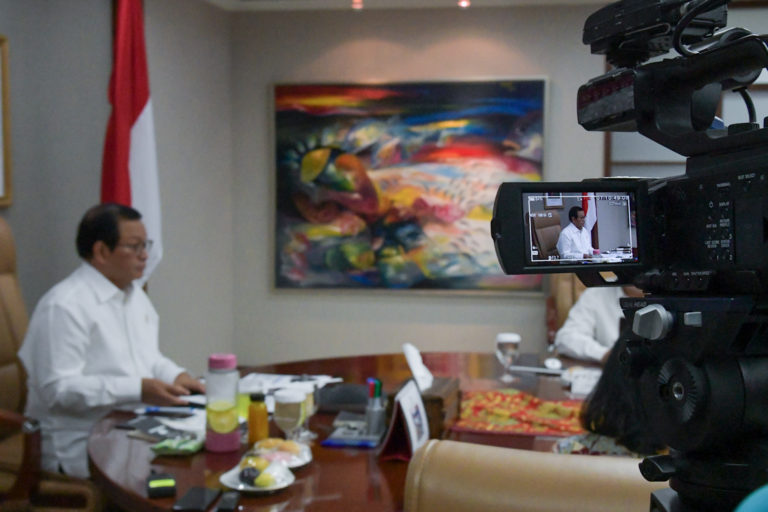Gov’t to Reformulate Standards in Primary and Secondary Education

Cabinet Secretary listens to the President’s remarks during an online Limited Cabinet Meeting in Jakarta, Friday (3/4). Photo by: PR/Ibrahim.
President Joko “Jokowi” Widodo has said that the cancellation of the 2020 National Exams and Indonesia’s ranking in the Program for International Student Assessment (PISA) could be a momentum to reformulate the national educational evaluation system as well as standard for primary and secondary education.
“(We are considering several options) whether in controlling the quality of national education we use only the National Exams or we also use standards that are applied internationally such as PISA,” the President said in his remarks at an online Limited Cabinet Meeting from the Merdeka Palace, Jakarta, Friday (3/4 ).
Indonesia, according to the President, has participated in seven PISA surveys from 2000 to 2018 and the PISA survey shows that Indonesia’s education system has become more inclusive and open in the last 18 years.
“However, the report I received stated that our average score of PISA in 2018 decreased in three areas of competence with the biggest decrease is in reading. Reading literacy of Indonesian students is in 74th position with a score of 371, mathematics literacy is in 73rd position with a score of 379, and science literacy is in 71st position with a score of 396,” the President added.
Based on the findings of the PISA survey, the President conveyed that there are three main problems:
First, the large percentage of low-achieving students. Even though Indonesia has succeeded in increasing access of 15-year-old children to the school system, more efforts are still needed to reduce low-achieving students to approximately 15% to 20% in 2030.
Second, the high percentage (16%) of students who failed to get promoted to the next grade.
“This figure is 5% higher than the average in OECD (Organisation for Economic Cooperation and Development) countries,” the President added.
Third, the low students attendance.
The President further said the PISA survey findings required comprehensive improvement measures in terms of regulations, budget, infrastructure, school management, teacher’s quality and administrative burden on teachers.
“I have highlighted this problem before. The administrative burden on teachers will discourage them from focusing on teaching and learning activities,” the President said.
On that occasion, the President also ordered the improvements in learning process, especially the use of information and communication technology. The President also ordered the improvement in student learning environment, including by providing learning motivation and overcoming bullying at schools.
“The results of the PISA survey and the National Exams show the strong relationship between students’ socioeconomic conditions and their National Exams or PISA scores,” the President concluded. (FID/EN)
Translated by: Ridwan Ibadurrohman
Reviewed by: Mia Medyana








